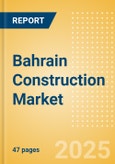3 Context
3.1 Economic Performance
3.2 Political Environment and Policy
3.3 Demographics
3.4 Risk Profile
4 Construction Outlook
4.1 All Construction
- Outlook
- Latest news and developments
4.2 Commercial Construction
- Outlook
- Project analytics
- Latest news and developments
4.3 Industrial Construction
- Outlook
- Project analytics
- Latest news and developments
4.4 Infrastructure Construction
- Outlook
- Project analytics
- Latest news and developments
4.5 Energy and Utilities Construction
- Outlook
- Project analytics
- Latest news and developments
4.6 Institutional Construction
- Outlook
- Project analytics
- Latest news and developments
4.7 Residential Construction
- Outlook
- Project analytics
- Latest news and developments
5 Key Industry Participants
5.1 Contractors
5.2 Consultants
7 Appendix
7.1 What is this Report About?
7.2 Definitions
7.3 CRI Methodology
- About the Analyst
- Contact the Publisher
List of Tables
Table 1: Construction Industry Key Data
Table 2: Bahrain, Key Economic Indicators
Table 3: Bahrain, Commercial Construction Output by Project Type (Real % Change), 2020-29
Table 4: Bahrain, Top Commercial Construction Projects by Value
Table 5: Bahrain, Industrial Construction Output by Project Type (Real % Change), 2020-29
Table 6: Bahrain, Top Industrial Construction Projects by Value
Table 7: Bahrain, Infrastructure Construction Output by Project Type (Real % Change), 2020-29
Table 8: Bahrain, Top Infrastructure Construction Projects by Value
Table 9: Bahrain, Energy and Utilities Construction Output by Project Type (Real % Change), 2020-29
Table 10: Bahrain, Top Energy and Utilities Construction Projects by Value
Table 11: Bahrain, Institutional Construction Output by Project Type (Real % Change), 2020-29
Table 12: Bahrain, Top Institutional Construction Projects by Value
Table 13: Bahrain, Residential Construction Output by Project Type (Real % Change), 2020-29
Table 14: Bahrain, Top Residential Construction Projects by Value
Table 15: Bahrain, Key Contractors
Table 16: Bahrain, Key Consultants
Table 17: Bahrain, Construction Output Value (Real, $ Million)
Table 18: Bahrain, Construction Output Value (Nominal, BHD Million)
Table 19: the analyst Construction Market Definitions
Table 20: Risk Dimensions
Table 21: Ratings, Scores and Definitions
List of Figures
Figure 1: Middle East and North Africa, Construction Output (Real % Change), 2023-29
Figure 2: Bahrain, Construction Output by Sector (Real % Change), 2023-25 and 2026-29
Figure 3: Bahrain, Risk Summary
Figure 4: Bahrain, Risk Regional Comparison
Figure 5: Bahrain, Construction Output Value (Real, $ Million, 2022 Prices and Exchange Rate), 2020-29
Figure 6: Bahrain, Construction Output Value, by Sector (Real, $ Million), 2020-29
Figure 7: Bahrain, Constructions Value-Add (BHD Million, 2010 Constant Prices)
Figure 8: Bahrain, Value of Tenders Awarded (BHD Million)
Figure 9: Bahrain, Outstanding Loans and Advances to the Construction and Real Estate Sector (BHD Million)
Figure 10: Bahrain, Business Confidence Index (2017=100)
Figure 11: Bahrain, Foreign Direct Investment (FDI) in Construction (BHD million)
Figure 12: Bahrain, Commercial Construction Output by Project Type (Real, $ Million), 2020-29
Figure 13: Bahrain, Commercial Construction Projects Pipeline, Value by Stage ($ Million)
Figure 14: Bahrain, Wholesale and Retail Trade Value-add (BHD Million, 2010 Constant Prices)
Figure 15: Bahrain, Outstanding Loans and Advances to the Accommodation and Food Service Sector (BHD Million)
Figure 16: Bahrain, Industrial Construction Output by Project Type (Real, $ Million), 2020-29
Figure 17: Bahrain, Industrial Construction Projects Pipeline, Value by Stage ($ Million)
Figure 18: Bahrain, Manufacturing Value-Add (BHD Million, 2010 Constant Prices)
Figure 19: Bahrain, Mining and Quarrying Value-Add (BHD Million, 2010 Constant Prices)
Figure 20: Bahrain, Producer Price Index (2020=100)
Figure 21: Bahrain, Infrastructure Construction Output by Project Type (Real, $ Million), 2020-29
Figure 22: Bahrain, Infrastructure Construction Projects Pipeline, Value by Stage ($ Million)
Figure 23: Bahrain, Transportation and Storage Value-Add (BHD Million, 2010 Constant Prices)
Figure 24: Bahrain, Energy and Utilities Construction Output by Project Type (Real, $ Million), 2020-29
Figure 25: Bahrain, Energy and Utilities Construction Projects Pipeline, Value by Stage ($ Million)
Figure 26: Bahrain, Electricity and Water Value-add (BHD Million, 2010 Constant Prices)
Figure 27: Bahrain, Institutional Construction Output by Project Type (Real, $ Million), 2020-29
Figure 28: Bahrain, Institutional Construction Projects Pipeline, Value by Stage ($ Million)
Figure 29: Bahrain, Education Value-Add (BHD Million, 2010 Constant Prices)
Figure 30: Bahrain, Human Health and Social Work Activities Value-add (BHD Million, 2010 Constant Prices)
Figure 31: Bahrain, Residential Construction Output by Project Type (Real, $ Million), 2020-29
Figure 32: Bahrain, Residential Construction Projects Pipeline, Value by Stage ($ Million)
Figure 33: Bahrain, Real Estate Value-Add (BHD Million, 2010 Constant Prices)
Figure 34: Bahrain, Headquarters of Key Contractors (% of Total Project Pipeline)
Figure 35: Bahrain, Headquarters of Key Consultants (% of Total Project Pipeline)








